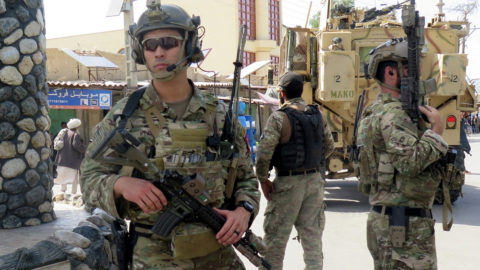
Try to imagine the reverse: armed and decked out Taliban fighters patrolling your street, talking to your family. What would your reaction be?
I spent many years poring over the history of the British colonies in America, trying to understand the experience of the young George Washington, which I wrote about in For King and Country, and of the Scotch-Irish, which I chronicled in West From Shenandoah. Over and over again I was appalled by the stunning ignorance of British military and political leaders about the native peoples from whom they were trying to wrest control of a continent. I was even more appalled to discover that the ignorance — compounded by a total lack of curiosity — continues among most Americans today.
When the British negotiated land sales and treaties with a people who had no regard for the written word but revered, remembered and honored the spoken word (their entire history was an oral history), and when the British altered in their favor the written summary of a council decision and congratulated themselves when the principals “signed” it (an act with no significance for the tribes whatsoever), the stage was set for future carnage. The principals walked away from the deal believing in radically different outcomes.
The British belittled the role of women in natve society, ignorant of the fact that it was matrilineal — women possessed awesome power, and remembered slights. The British did not know that clans — the foundation of all social interaction among the tribes — existed. They insisted on dealing with “chiefs,” and “kings,” when no such offices existed in native culture. And on and on.
What difference did it make? Not much, to the eventual outcome. The British and their American successors, aided by infectious diseases, pretty much wiped out the native populations. But far fewer people would have died, many of them in accidental uproars based on blind misunderstanding, had a few people paid some attention to the people they were dealing with.
What difference does it make that the ignorance continues? Consider Afghanistan.
In a recent, searing op-ed in The Washington Post, Baktash Ahadi, an Afghan interpreter who worked with American forces, detailed the ignorance and its consequences. American soldiers stalking through Afghan villages in their alien clothing, with their brutal looking weapons at the ready, seldom removed their insect-like sunglasses when speaking with villagers who placed a high value on eye contact, and thus insulted them. Sometimes a male soldier would approach and speak directly with a female villager, a gross violation of Afghan custom.
Do the Afghans seem ungrateful for the billions of dollars worth of goodies we gave them? Yes, we built schools and clinics and roads, but without ever asking the Afghans what they wanted, And having built it, usually we left, and usually the Taliban destroyed or pre-empted what we had built. We didn’t seem generous to the Afghans, we seemed dumb. As Baktash Ahadi put it:
“From the point of view of many Afghans, Americans might as well have been extraterrestrials, descending out of the black sky every few weeks, looking and acting alien, and always bringing disruption, if not outright ruin. We failed to understand what made sense for Afghans time and time again. No wonder the Taliban maintained such sway over the past 20 years.”
As the British never understood — never even saw — the natives they were seeking to dominate, so the Americans never understood — never tried to understand — the Afghans or the Taliban. The case is laid out in even more excruciating detail in an article in Prospect — “Nemesis: Why the west was doomed to lose in Afghanistan.”
To paraphrase — and I think improve — Graham Greene’s The Quiet American, “Ignorance is like a dumb leper who has lost his bell, wandering through the world, meaning no harm.” The fact is, ignorance kills.
Theodore Parker perceived the moral arc of the universe “bends towards justice.”
feigned ignorance in support of injustice has a time and a season and then it is done
“the Tao is impartial, it stays with good men all of the time” Lao Tzu
too late for crocodile tears, what did Rhett say to Scarlet
Maybe if we would have spoken louder they the Afghans might have somehow been able to understand or foreign English language easier, I am sure very few young American
soldiers were trained in Afgan cultural etiquette at all.
It seems a commonplace of empire that conquerors deny the cultures and civilizations they extinguish. The Romans claimed they had found ought but savages in Britain and it was believed so thoroughly that even Brits until recently thought that those who built Stone Henge etc. lived a life that was “nasty, brutish and short.”
Good to see you back Mr Lewis
Thanks. To paraphrase an old saying about elder sex, I’m not as good as I was once upon a time, but I’m as good as I ever was, once in a while.